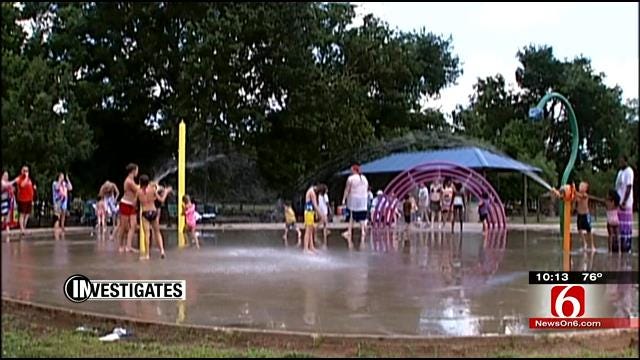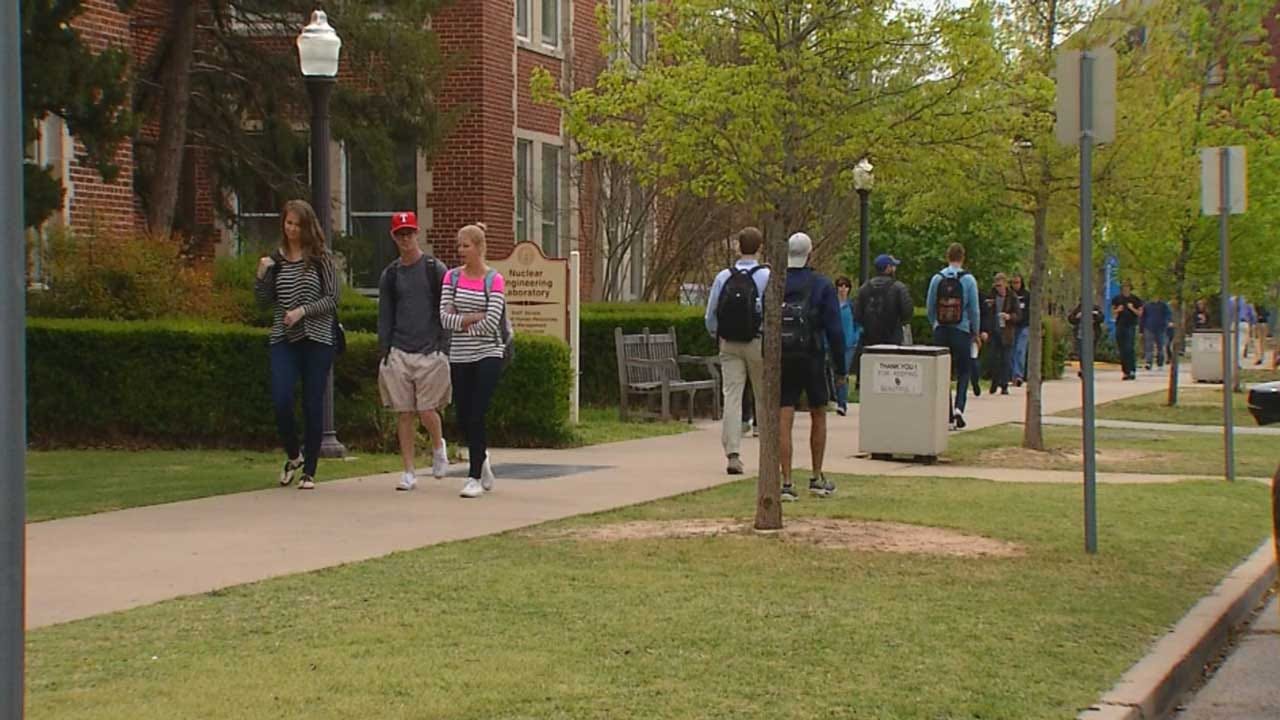6 Investigates Green Country Splash Pads
They're called splash pads or water playgrounds and they're going up everywhere, replacing public pools as a more budget-friendly alternative. But splash pads can be incubators for disease with several outbreaks documented in other states.<br />Monday, May 19th 2014, 11:40 am
They're called splash pads or water playgrounds and they're going up everywhere, replacing public pools as a more budget-friendly alternative. But splash pads can be incubators for disease with several outbreaks documented in other states.
Oklahoma no longer even regulates splash pads to know if they're safe. We looked into it and found there are concerns, especially after we tested the water.
Roger Roth is responsible for testing the water at every public pool in Tulsa County. He makes sure the chlorine and PH levels are just right, to prevent the spread of some nasty diseases.
Roth listed off some of the most common, "cryptosporidium, E. coli, staph... all of those things that can be transferred via water."
The state health department requires the operators of public pools to test the chlorine and PH levels four times a day. Splash pads used to be under those same regulations, but in 2010 state lawmakers exempted them from regulation and state testing stopped.
"But they do still pose the same risks as pools," 6 Investigates' Jennifer Loren asked.
"They can if you recirculate that water," Roth said.
That's the key. There are two different types of splash pads.
The first kind is called a flow-through splash pad, which means it uses fresh, potable water. So the water that comes out of the splash pad is the same water that comes out of nearby drinking fountains. Kids play in the water and then it goes down the drains, into the sewer.
All 31 of the splash pads run by the City of Tulsa are the flow-through type, virtually eliminating the possibility of water-borne illnesses.
The other type of splash pad recirculates the water over and over. The water comes out, kids play in it, it goes down the drain into a tank like this one... then, depending on how the park is set up, it goes through filters and back out to the splash pad.
The water at recirculating splash pads can pose a health risk if not cared for properly, allowing bacteria to flourish.
The most common disease spread at public bathing places: cryptosporidiosis, or crypto, which causes severe diarrhea for up to three weeks and possibly hospitalization.
The CDC reports cases of crypto have quadrupled in recent years, with outbreaks documented at recirculating splash pads in Idaho, Florida and New York. Chlorine won't kill it, but a UV filter will.
The county-run splash pad at 41st and Riverside is recirculating and chlorinated, but does not have a UV filter. Crypto could easily spread here.
That's why it's important to follow park rules:
Avoid accidents in the water.
Non-potty trained children and babies should wear swim diapers.
Don't allow children to swallow the water.
Moms we talked to said they were not concerned about water quality at splash pads.
"I don't have any concerns about what's in it," said the mother of a baby boy playing in the water.
"No, I've never even thought about that," said Tulsa mother Myra, who has five children who play in the splash pad at RiverParks.
We wanted to see how the water measures up, so we tested it ourselves. We used a standard OTO Test Kit to test the chlorine and PH levels, which showed the chlorine levels at RiverParks splash pad were over-chlorinated.
Over-chlorination will kill most disease-carrying bacteria, but it's still not good news for Myra, the mother of five.
"I have little small kids, you know. And some of my kids do have sensitive skin. So, you know, I'll be I'll think about that more," she said.
In fact over-chlorination can cause serious burns. Sara Gadd's children were among 17 kids burned by chlorine at the Liberty Park splash pad in Sapulpa last year. Her two-year-old daughter suffered the worst injuries.
"It looked like very deep sores. They were bleeding," said Gadd. "They were very red, and she could barely walk."
That splash pad, like many recirculating splash pads, is run by an automated system that broke.
But what else could be in splash pad water? We asked TU biology professor Marsha Howard to find out. Howard and a team of students took several water samples from two of Tulsa's most popular splash pads: the one at Riverparks and the small splash pad at Guthrie Green downtown.
The team took its samples to the lab to look for disease-causing bacteria like E. coli, parasites and even traces of deadly amoebas.
At 41st and Riverside, where we found high levels of chlorine, professors say the tests found no bacteria.
At Guthrie Green, where the splash pad uses a UV filter, professors say the tests revealed the water was contaminated with significant amounts of bacteria. While their tests showed it was not the kind that causes disease, professors say it too could survive in the water taken from the park.
We alerted Guthrie Green managers who immediately shut down the fountain, and had maintenance workers shock the automated system with chlorine.
In a statement, managers said, "Guthrie Green follows best practices for splash pad sanitation, using UV and chlorine for water quality. In addition, we scrub the deck with chlorine solution. We have water quality experts test our fountains several times a week, and the results have always shown that the water is safe. We are increasing frequency of water testing and remain committed to continuing to provide a safe environment for visitors."
But without regulations, some say it's only a matter of time before an Oklahoma splash pad causes an outbreak.
Parents should also avoid any warm stagnant water on or around splash pads as that's where amoebas, some of them deadly, can live.
More Like This
May 19th, 2014
November 22nd, 2016
June 9th, 2016
Top Headlines
April 17th, 2024
April 17th, 2024
April 17th, 2024












